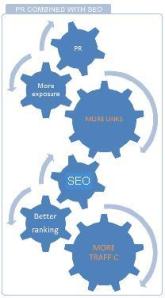The increased importance of the Internet, and hence new media, may make brands believe that having a substantial online exposure is “the one and only” marketing communications tool of the future to which they can entirely delegate this function and ensure their brand reputation flow. Classical marketing tools such as Public Relations (PR) are suffering as a result of being questioned regarding their relevance in a time where every individual can speak out and be heard by the rest of the world. Search Engine Optimisation (SEO) experts that promote their service of focusing on increased online exposure are giving PR a hard time. Many brands believe that being well presented online with high page ranks and a lot of hits on Google (“Increase your Google hits” by Ron Castle) can replace PR services entirely.
Given the increasing online competition and rising power of new media, the idea of placing the main focus on online campaigns is very tempting. SEO agencies specialise in increasing the level of online exposure using systematic keyword and metadata management, they promote themselves as a way for brands to ensure high page rank and search engine position. Nevertheless, they are lacking the ability to offer “reputation management” and cannot fully replace the role of a PR agency. Globally, the use of the Internet and social networks has increased rapidly, which has offered many opportunities for individuals and brands to have a “public voice”. Even if the role of PR has been challenged by the Internet offering great opportunities to “do it yourself” its importance should not be underestimated. Core tasks of PR such as reputation management, strategic counsel, expertise and increase in media exposure cannot simply be excluded.
Comparing the people behind the services, PR and SEO are two very different dimensions. Whilst SEO specialists have high technical skills and interests, their job consists of HTML generation, page content formatting, systematic keyword selection and implementation, metadata management and page linkage to relevant online resources. In contrast, PR people have rather linguistic skills along with research interests; their business is in understanding the industries and environments their clients operate in order to provide them with strategic reputation management and advice through a network of relevant contacts. Also from an academic perspective it would be different study programs; PR/Marketing for the ones and IT for the others.
Moreover SEO and PR pursue two completely different objectives: whilst SEO aims to create long term traffic, PR in addition to long term traffic, is also concerned with short term traffic. Another aspect is the difference of their operation areas: SEO influences online exposure only and PR concerns on- and offline traffic.
So why is there this ongoing discussion about SEO vs. PR?
As David Meerman Scott points out, keywords alone cannot substitute for good content, which supports the fact that the skills of PR people are required. He also stresses that brands should create content that its target customers or as he calls it “buyer personas“ are interested in – it has to solve their problems, rather than promote services or create content around beneficial key phrases. “For ranking in Google, however, the main benefit of a press release is not direct links or page rank from the press release directly; it is primarily the people who decide to write an article and create links to the product or brand because of the press release“ (Matt Cutts, head of Google’s WebSpam team, 2005), which also implies that people must like your content in order to link to it.
Unity is Strength
SEO should not be considered as a direct competitor of PR, but rather as a tool that PR must apply, in order to flourish online.
Successful online campaigns should always be backed up by offline strategies to achieve cohesive reputation control. All in all these are marketing communications that should be part of an ongoing marketing strategy. I found that picture in a post by Emmanuel Idé, who also shares the opinion about combining PR and SEO that serves as perfect illustration and modified it a little.
Combined these two can maximise ROI factors and secure both the push and the pull effects of marketing communications. Having a balance of push, pull and profile strategies is also recommended by academic literature (e.g. Chris Fill – Marketing Communications). Finally, is consideration of the statement by Phil Dennison, senior marketing specialist of Business Wire: “Make sure name and brand are in the right place at the right time when people are looking for them.” (Read the full story here)
Many organisations are already doing it, and an excellent presentation is delivered by Common Craft:











